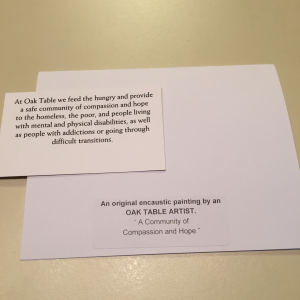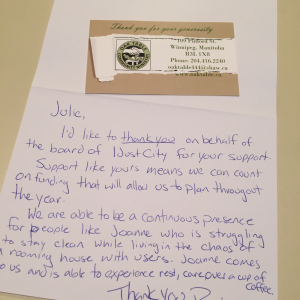What’s the cost of a lost opportunity?We often hear people talk about the return on investment related to particular fundraising activities. (We often hear people never talking about ROI, but that’s for a different post!). But how many consider the opportunity costs of their decisions? In other words, what are you not able to do if you do something else? Consider:
Maximize your time and opportunities to meet donors, thank donors and ask people for gifts. Measure your activities against opportunity costs. Always ask yourself: do you need to do something or is it time to move on to a different activity with higher potential? Julie Mikuska. · Silos hold grain, not donorsHave you encountered these scenarios?
In all of these cases, staff are working in silos. They are protecting their turf because they don’t see how it’s in their interest to open their processes and departments to be donor-focused. What can you do to knock down the silo walls?
And don’t keep your donors in your own silo. Share stories of joyful giving with others to show them that donors care. Julie Mikuska. · The RFP shake-downWhy do charitable organizations think it’s appropriate to ask for a donation or pro-bono work in an RFP? Not that we have any intention of responding to a request for proposal, but my blood still boils when I read an often used clause that goes something like this: “X Organization is a registered charity which provides funds for research, programs and other activities which promote and advance the health of all members of the community. Our organization is able to engage the citizens of the province in philanthropy by working with donors and partner suppliers. As such, we ask that you please indicate your company’s interest in supporting our organization through philanthropy or sponsorship: e.g. direct discount, no-charge services, etc.” I call it the RFP shakedown. Where else do you see the beginning of a business relationship where you’re already being asked to do free work (ok, I know graphic designers get this all the time, too) or give money back? Consulting work is similar to philanthropy in that both are based on trusted relationships. When you engage a consultant, you’re making an investment in your organization. In turn, we provide guidance based on our experience and expertise, and we are fairly compensated for the value we bring. If, in the course of our relationship, we are moved to make a donation, we may do so, and we often do. But don’t ask us to make that part of any proposal or contract. Julie Mikuska. · Taking choice away from your donorsAre you taking choice away from your donors or potential donors by not asking them to give? Are you assuming they can’t or won’t give and so you don’t ask? We’ve heard it often. “Oh, we can’t ask that person. They have kids in university so they will have no money for us.” “Our patrons are low-income. They don’t have any money to donate.” “We can’t ask her! She just gave us a big gift.” All of these excuses are based on what you assume about people. By not asking, you are taking away their opportunity to make a difference in the world through your organization. Remember – it’s not about the money. It’s about the donor feeling good about the effect she can have on people who need her help. Think about it:
Ask yourself why you’re not asking. Julie Mikuska.
· Ethical fundraising is not like salesIt’s amazing how often we’re asked if we take a percentage of funds raised, and how astonished prospective clients are when we say no, that happens to be unethical. Up until that moment, they have equated fundraising with sales, where the seller seeks to maximize profit. Ethical fundraising is multi-faceted. It seeks to engage donors in long-term relationships that benefit both the donor and the organization. It is not focused on the “bottom line”. It is transparent and honest. It does not look at donors as “low-hanging fruit.” It is respectful. The Association of Fundraising Professionals (AFP) has a Code of Ethical Principles and Standards that all members must annually sign. It has 25 ethical standards that members must meet. Laura and I are members, and we urge everyone who is in development to join. But a commitment to ethics goes well beyond the development staff. In a culture of engagement and philanthropy, the CEO/executive director, board members, staff and volunteers must all learn about ethical fundraising and how it will, in fact, make it easier to engage donors. So what does ethical fundraising look like?
If you live and breathe ethical fundraising, your donors will thank you. And you can turn around and thank them. Julie Mikuska. · Fundraising vs philanthropyFundraising is an activity. Philanthropy is an attitude. Take, for example, the attitude of a board member who only participates in fundraising by buying tickets to the gala. He may not even attend the gala but in his mind he has done his part. Contrast that with another board member who organizes a table at the gala, asking friends and colleagues to attend and find out more about why she is so involved and passionate about the organization. She makes sure to introduce everyone at the table to the executive director and other staff and volunteers who, in turn, bring stories about individuals whose lives have changed because of donors. Some of the friends at the table participate in the auction at the gala; they are all asked to give in the fall appeal. In the first example it’s all about the transaction. It’s impersonal. No new people are invited to change the world through the organization and the opportunity has been lost. But it was considered fundraising. In the second example the board member is modelling philanthropy. She is engaging her circle of friends and asking them to join her (because of course she has given her gift first as well as buying tickets to the gala). She makes sure her friends know how cherished donors are, and she gives them the opportunity to give. It’s personal and emotional, heartfelt and warm. Are you a fundraiser or philanthropist? Julie Mikuska. · A true giftI received a lovely gift in the mail today – a handwritten thank you on a card featuring the artwork of a client, hand-addressed with a real stamp on the envelope. A real stand-out in my mailbox! The card was from 1JustCity, an umbrella organization in Winnipeg bringing together four community ministries: Oak Table, North End Stella Community Ministry, West Broadway Community Services and St. Matthews Maryland Community Ministry. They do amazing work and, in their own words, they “love the under-loved.” And we get to work with them as clients. And in one short card, they told me what a difference I’m making in the life of one person. And because I’m a monthly donor, I’ll think of Joanne and others like her every month as I’m notified of my donation through CanadaHelps. How are you thanking your donors? Julie Mikuska
· Time to think about your legacyDo you have a valid and up-to-date will? Yes, I’m talking to you. Not about donors leaving your organization a bequest. We all need a will that sets out our wishes after we die, including who gets what part of your assets and who will be asked to be executor. It’s really important to do this while you are able and to not put it off until it’s too late and the division of your legacy is left to strangers or squabbling relatives. Think, too, of your own legacy and which social impact organizations have meaning to you. You may not be able to give large donations while you’re living, but you, too, can make a huge impact through your estate. The Winnipeg Foundation, along with the Manitoba Bar Association and the Public Guardian and Trustee of Manitoba, is presenting the annual Will Week May 2 to 6, 2016. Take advantage of a host of seminars to learn how to create a will, update your existing will and how to arrange for charitable giving in your will. The Winnipeg Foundation is also holding Bequest 101 sessions in May and early June. So, if you have a will that represents your wishes and creates your legacy – wonderful! If not, now’s the time to act. Julie Mikuska.
· Moving…onI received an appeal from a large organization this week. Notwithstanding how awful the appeal was, what struck me first was the fact that they sent it to my former address. I haven’t lived there for almost 3 years. People move all the time. Many of your donors are among them. If you expect to maintain a relationship with them, you must make an effort to make sure you’re sending your appeal to their current address. There are ways to do this:
By not making an effort to check contact information, not only do you lose money on mailing costs, you also risk losing the donor. That’s why I’m moving on. Laura Mikuska · Finding inspirationIt can be easy to be cynical, to hunker down and be mired in one’s own life. It can be even easier to ignore others’ troubles and pain. What I love most about what we do is that we see everyday heroes who make a difference in their world. One of our clients has especially inspired me to share my love of good food and cooking with a group of teens. Food Matters Manitoba creates opportunities for kids and new Canadians to learn how to choose and prepare good food to promote healthy eating. I had a chance to chat with their staff before I proposed a cooking class to students in an alternative program in south Winnipeg – their tips were very helpful. The kids were all enthusiastic about good food! We decided to prepare lasagne and homemade buns. When preparation was underway, one young man declared that this was the first time he had ever cut up a fresh vegetable. Imagine being a teenager and never having had the opportunity to cut up a carrot! He was especially proud of his contribution to the meal. Another said he had eaten lasagna before, but never knew exactly what went into it. He had two helpings. I’m especially appreciative that they allow me to share this experience with them, to see their delight at what they’ve accomplished. I look forward to our next cooking adventure – this time we’re preparing tourtière and pea soup. Who has inspired you lately? Laura Mikuska · |
Blog Archives
Articles By Category
|










